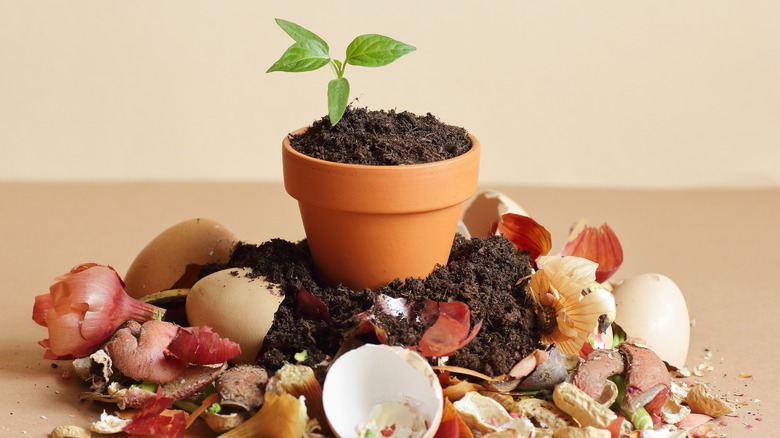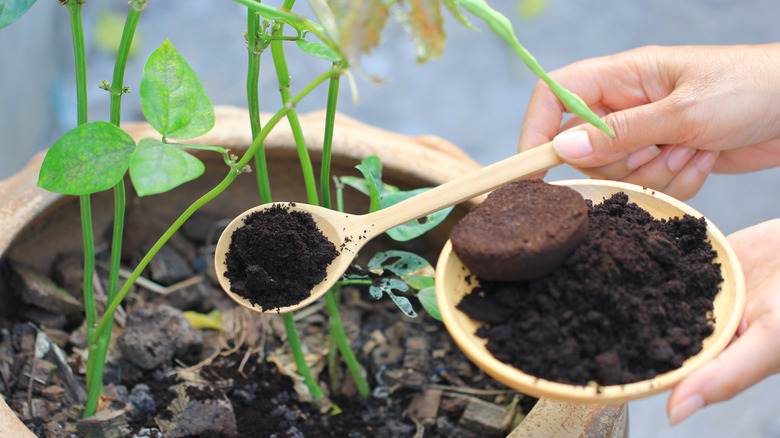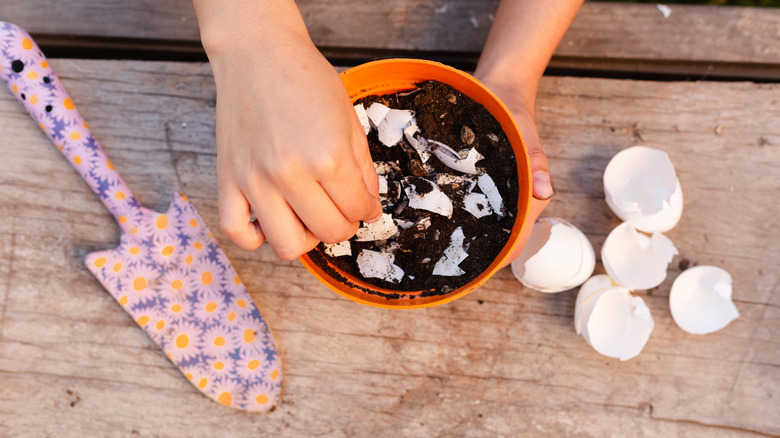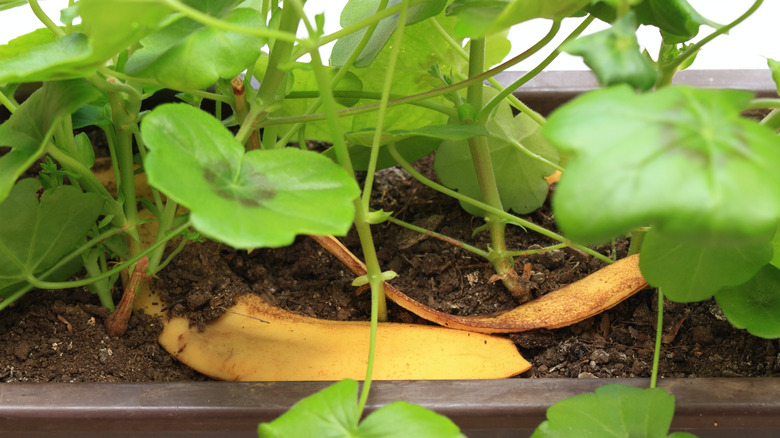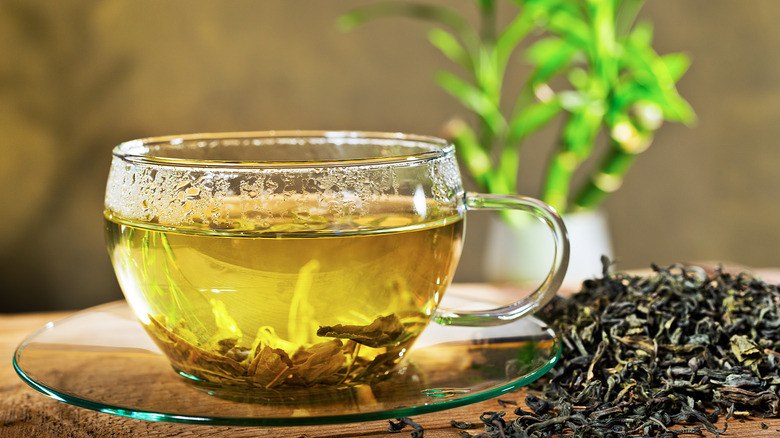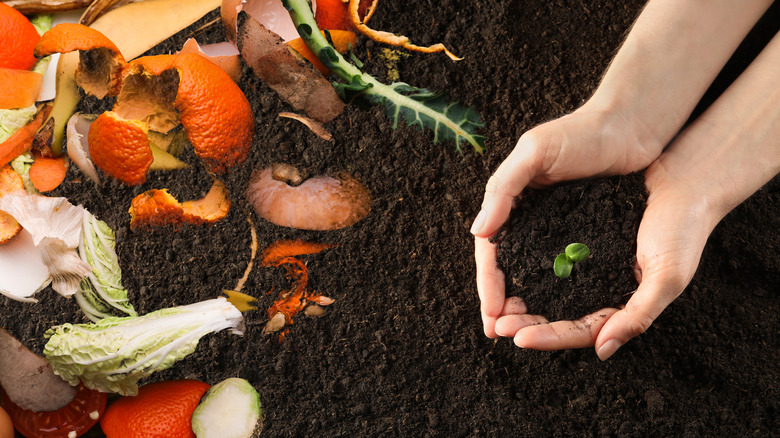5 Common Household Items That Can Be Used As Natural Fertilizer
Harsh chemical fertilizers have the potential to do as much harm as they do good for your garden, and this may leave you feeling like it's time to go organic. After all, as a gardener, it's important to do what's best for the earth. However, store-bought organic products often cost more than you might want (or be able) to pay. Lucky for home gardeners, many common household items can be used as natural fertilizers, most of which can already be found in your kitchen! If you're not looking to manage a messy compost pile, or simply don't have the space to do so, that's not a problem. The good old Farmer's Almanac — you know, the one that's been doling out steadfast farming advice for over 200 years — assures us that many of these items work as beneficial fertilizers in their own right.
It's a triple win situation when you begin saving money, as well as time, while also taking strides to help the environment by minimizing the waste that gets transported to trash heaps. You've got plenty of options when looking for items that are rich in the very nutrients your flowers and vegetables need to grow healthy and strong. Some boost overall yield, while others amend and improve soil quality. Let's take a closer look at five options you most likely have in your kitchen right now.
Coffee grounds
The benefit of coffee grounds in the garden has been purported for ages, but there is some confusion over exactly what those grounds are accomplishing. Initially, many people thought that since coffee is acidic, then used coffee grounds must be acidic as well. That turns out not to be true. As clarified by the Oregon State University Extension Service, the acid content is water-soluble, therefore it actually remains in the coffee, thus making the grounds pH neutral. All this really means is that if you've been adding coffee grounds to plants that crave acidic soil, you probably haven't managed to lower the pH level as much as you might have hoped. But don't despair! Coffee grounds are still beneficial in other ways.
Soil tilth is a term used to describe the condition of tilled soil. It's a way to know if it's structured well for growing plants. Oregon State Extension goes on to explain that, when added to the garden, coffee grounds improve soil tilth. They also bring important nutrients to the soil, especially nitrogen. Grounds can be mixed in or spread on top of soil over in-ground gardens or containers. If you're a coffee fanatic and have even more to go around, your houseplants will appreciate a fresh sprinkle every now and then too. Having said that, don't overdo it. A report published by The Guardian points out that coffee grounds contain caffeine, which has been known to hinder plant growth in certain species.
Eggshells
According to the gardening experts at Grow Veg, crushed eggshells are good for both the human body and the garden. If you have zero interest in ingesting eggshell powder anytime soon, then that will just mean more for your happy little plants. Furthermore, if you don't even want to take the time to crush the shells for your garden, you can simply steep them in water for a few days and then use that strained water for your next round of irrigation. It's the calcium in eggshells that provides a beneficial boost to your garden soil. A 2019 report published in Frontiers in Plant Science goes so far as to call calcium an essential element for plant health. It improves the structural integrity of cell walls, which gives calcium-rich plants a better chance of blocking out pathogens. Calcium also acts as a messenger by sending signals around the body of the plant to warn of potential viruses.
Grow Veg adds that eggshell added to tomato plants has shown itself to be particularly successful in discouraging blossom-end rot, a serious problem brought on by environmental stressors such as freezing and drought, per the Alabama A&M and Auburn Universities Extension. Blossom-end rot can lead to problems with black mold, so it's definitely a condition you want to prevent.
Banana peels
Self-proclaimed guerrilla gardener Ron Finley talks about using banana peels as fertilizer in his MasterClass on gardening. Sure, you can add them to a compost pile if that's what you've got going on, but you can also apply them directly to your soil instead. Bananas offer a slew of nutrients, but it's their magnesium content that sets them apart. If you remember anything about photosynthesis from your high school science class, you will know that it's the process of utilizing the sun's energy for growth and sustenance. Magnesium is absolutely critical for photosynthesis. Easy Grow explains that it activates the enzymes that allow chlorophyll to function. Similar to the way the human body will sacrifice its limbs to save its organs, a magnesium-deficient plant will transfer nutrients from the bottom up towards the new growth at the top. This is the reason why a suffering plant is likely to have yellowing leaves around its base.
Finley also suggests that, just like eggshells, banana peels can be steeped or fermented in water, which is then used as a spray. If you have plants such as blueberries that desire a low acidic pH level in their soil, let those peels steep for at least a solid month. And here's one final benefit of adding banana peels (or banana-infused water) to your garden: They will naturally repel aphids.
Loose leaf tea
It may be hard to imagine for some, but not everyone in the world loves coffee. So what about the tea drinkers? Well, according to The Republic of Tea, steeped tea leaves can be beneficial when applied directly to the soil of your garden or houseplants. Loose leaves can be spread as-is once they've cooled off, and compostable teabags can be buried under the soil to release over time. The compostable aspect of the teabag material is important, so make sure you know what they're made of before sinking them into the ground. If you're unsure, you can simply break open the bag; spread the tea leaves; and dispose of the bag, string, and staple that are often included.
The Republic of Tea further notes that the benefit of tea leaves comes from their nutrient content; specifically, nitrogen, phosphorus, and potassium, which make up the trifecta of elements most commonly found in commercial fertilizers. Commonly called NPK for their scientific element abbreviations, Simply Smart Gardening notes that these three nutrients are the ones plants need most to thrive. Nitrogen aids in tissue production and helps leaves stay a strong, saturated shade of green. Phosphorus is good for healthy roots and seeds, and it also increases your plant's ability to make efficient use of the sun's energy. Last but not least, potassium boosts overall strength while bolstering resistance to diseases.
Kitchen scraps
Things can get a little messier when you start to use a wider array of kitchen scraps, so this is the point when you may want to consider making your own compost. It's actually inexpensive and easy to do! According to the Washington Department Of Ecology, here's all you need to get started with an at-home compost project: a plastic bin with a tight-fitting lid, a hammer and nail or a drill, dry leaves or newspaper, clean soil, and your kitchen scraps. Use the hammer and nail or the drill to puncture holes into the bottom of your bin and the cover. Gather together enough dry leaves or newspaper to fill the bottom quarter of the bin. Cover them with dirt until the halfway point. After that, pile on the food scraps. If you have any more coffee grounds, eggshells, banana peels, or loose leaf tea lying around they can, of course, go in too. Otherwise, stick to fruit and vegetable trimmings and peels, etc. roughly mix everything together, making sure the top is covered in dirt, and lightly water with a garden hose. Finally, secure the cover and move the bin a fair distance from your house where it can be shaded.
When it comes to making at-home compost it's important to remember that dairy products, oils, meats, and bones should never be added, as they will attract pests and can produce offensive odors.
